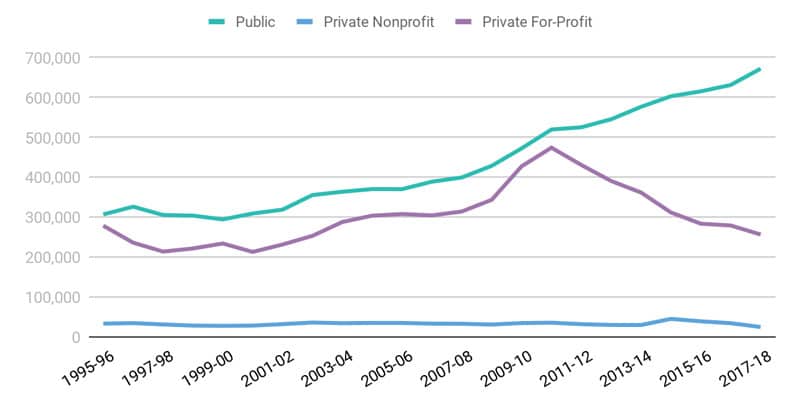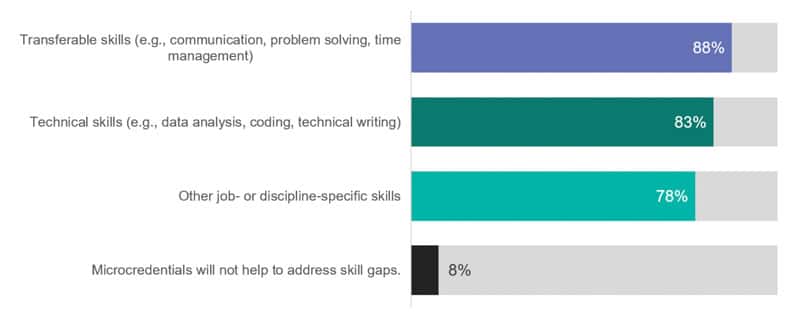New study highlights the expanding landscape of microcredentials
- Major study destinations around the world are reporting a significant expansion of short non-degree programming over the past decade
- These microcredentials focus on skills development and are increasingly being integrated into formal qualification frameworks
A recent report from Colleges & Institutes Canada (CICan) explores the growing provision of microcredentials, in Canada and elsewhere, and sets the stage for the establishment of a national framework for these alternate qualifications in Canada.
Those terms – "microcredential", "alternative qualification", or even "short certificate" – are used interchangeably to some extent. The space is evolving quickly and the context for these programmes varies from destination to destination. In simple terms, we can understand these terms to refer to something other than a full degree, and to a shorter-term qualification that may be undertaken either in preparation for, or as a complement to, degree studies.
For its part, the CICan paper applies this working definition: "A microcredential is a certification of assessed competencies that is additional, alternate, complementary to, or a component of a formal qualification.”
That construction suggests a programme targeted to a specific aspect of skills development, and a qualification that could be combined with other short programmes or "stacked" on top of other credentials.
Based on a survey of its members, CICan reports that 45% of Canadian colleges and institutes are currently offering microcredentials via a mix of online and in-person delivery, and another 33% are planning to do so in the future.
This follows a similar pattern in the United States as reported recently by the Center on Education & Labour Education Policy: "Short-term credentials are a large—and growing—business in higher education. In the first decade of the millennium, the number of short-term certificates awarded by community colleges increased by more than 150% across the United States. By 2010, 41% of all credentials awarded by community colleges were non-degree certificates. Since that time, the number of certificates awarded by all public colleges has increased by nearly 30%."

The CICan paper notes that microcredentials are well established within a number of education systems around the world, and the infrastructure for such programmes is becoming increasingly formalised. In New Zealand, for example, microcredentials are integrated within the National Qualification System, and they are commonly offered as well by both universities and TAFEs (technical and further education providers) in Australia.
The European Union, meanwhile, is moving to boost the recognition and transferability of microcredentials via its MICROBOL project. This relatively new initiative has explicit links to the broader aims of the Erasmus+ mobility programme and the European Higher Education Area, in particular the goal of increasing "access to continuous learning for all learners, regardless of their age, background, or experience."
All of this activity points to a growing appreciation by educators, policy makers, and students alike as to the need for additional training targeted to known skills gaps or labour market requirements. “In recent years, the Canadian labour market has been defined by technological change and disruption, creating the need for employees to consistently upgrade their skills to match”, says CICan President and CEO Denise Amyot. “The COVID-19 pandemic and the job loss it caused has only added to the challenge. The resulting need for upskilling and reskilling among many different sectors has created a trend toward short, specialised courses…that focus on specific competencies required by employers.” Aside from those local labour market requirements, Canadian institutions also clearly perceive international demand for these alternate credentials. Nearly half of colleges and institutes responding to the CICan survey (48%) say that they see international students as a target market for microcredential training.
And that broad focus on skills development is reflected in the following summary of responses from Canadian colleges and institutes on the role they believe microcredentials can play.

One big question that travels along with this expansion of micro programmes is how will employers respond? The research on this question is at an early stage, in Canada and elsewhere. "It is still very early to have a meaningful indication of participants’ and employers’ perceptions of microcredentialed training, and of real outcomes for employability," says CICan. But the paper reports as well of apparent strong, early interest on the part of employers in this new mode of skills training.
"The survey results illustrate that colleges and institutes do not see microcredentials as a passing fad but as a type of training that can benefit their communities and institutions in the long term," concludes the CICan report. "The offer of microcredentials is evolving very rapidly and both quantitative and qualitative data presented in this report will certainly change in the months to come."
For additional background, please see:













